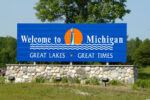
By James MacPherson
BISMARCK, N.D. (AP) — A North Dakota commission on Tuesday showed no appetite for putting the cost of citizen-led legislation on a ballot, and balked at a proposal that would have let lawmakers review a measure before a vote.
The 19-member Initiated and Referred Measures Study Commission made up of six lawmakers and 13 citizen representatives appointed by Gov. Doug Burgum was approved by Legislature last year to look into the initiated and referred measure process.
The panel was spurred largely by voters’ surprise approval of allowing the use of marijuana for medicine and another successful ballot measure funded almost solely by a California billionaire that amended the state’s constitution.
The panel has met a few times before but during a daylong meeting on Tuesday it began reviewing some 15 draft proposals that could be forwarded to the Legislature for consideration.
Republican Rep. Scott Louser of Minot backed a proposal that would require citizen-backed measures to go to the Legislature for a vote before they come to voters. If lawmakers — or the governor — rejected the measure it still would go before voters in the next general election.
Louser said the intent is to allow the research arm of the Legislature to help draft the measure so that it conforms to legal guidelines.
Separately, the panel did approve a proposal to allow backers of a citizen-led legislation to utilize lawyers from the Legislative Council to help them draft measures, if wanted.
That component was mostly inspired by voters’ approval of medical marijuana in 2016 that sent lawmakers, state health officials and law enforcement scrambling to solve a number of issues, including allowable forms and potency of medical pot, and oversight of distributors.
In the end, the Legislature had to work hard to get the needed two-thirds majority to amend the citizen initiative. The voter-approved version allowed far more freedom for citizens to grow and smoke the plant. Lawmakers removed provisions for growing it.
Minot attorney Robert Hale backed a proposal to post the cost of a measure on the ballot, saying, “voters should have that sort of information to make well-reasoned decisions.”
Some wondered, however, if the costs could be accurately determined and by whom. The proposal did not come to a vote by the panel.
North Dakota law allows citizens to bypass the Legislature and put a proposed law or constitutional amendment directly to voters if enough petition signatures are gathered.
Former Supreme Court Justice William Neumann, who heads the panel, has said their objective is in no way an effort to “squelch” public participation in the legislative process. He said any of the proposals could come up in the future but each must be endorsed twice before Sept. 1 deadline, which is four months before the Legislature reconvenes.



